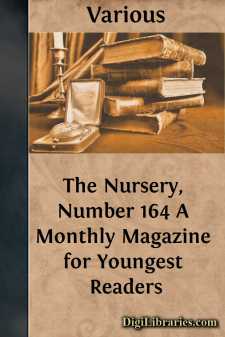Categories
- Antiques & Collectibles 13
- Architecture 36
- Art 48
- Bibles 22
- Biography & Autobiography 813
- Body, Mind & Spirit 142
- Business & Economics 28
- Children's Books 15
- Children's Fiction 12
- Computers 4
- Cooking 94
- Crafts & Hobbies 4
- Drama 346
- Education 46
- Family & Relationships 57
- Fiction 11828
- Games 19
- Gardening 17
- Health & Fitness 34
- History 1377
- House & Home 1
- Humor 147
- Juvenile Fiction 1873
- Juvenile Nonfiction 202
- Language Arts & Disciplines 88
- Law 16
- Literary Collections 686
- Literary Criticism 179
- Mathematics 13
- Medical 41
- Music 40
- Nature 179
- Non-Classifiable 1768
- Performing Arts 7
- Periodicals 1453
- Philosophy 64
- Photography 2
- Poetry 896
- Political Science 203
- Psychology 42
- Reference 154
- Religion 513
- Science 126
- Self-Help 84
- Social Science 81
- Sports & Recreation 34
- Study Aids 3
- Technology & Engineering 59
- Transportation 23
- Travel 463
- True Crime 29
The Nursery, Number 164 A Monthly Magazine for Youngest Readers
by: Various
Categories:
Description:
Excerpt
THE LITTLE TEACHER.
I know of a little girl, who, like Mozart, shows a great talent for music, though she is not yet ten years old. Before she could walk, it seemed to be her delight to creep along the floor to the piano, draw herself up so as to touch the key-board, and then strike the different keys.
Some of the sounds were pleasing to her, and from some she would start and draw back, as if she were hurt. A false note in music seemed to inflict pain, while she would show great pleasure when the harmony was perfect.
This little girl, whose name is Laura, has been so faithful in studying the rules of music, that, young as she is, she is employed to teach it to children still younger than herself. As her parents are poor, she is paid well for this service. In the picture you may see her standing, while Emma Dean, one of her little pupils, occupies the music-stool.
"Oh, I shall never learn to play like you, Miss Laura," says Emma.
"Pray don't call me Miss," says Laura; "for I am but a little girl like yourself."
"But then you know so much more than I do, that I like to call you Miss," says Emma. "Are you not my teacher?"
"I try to be," says Laura; "but, if we talk instead of work, we shall not make much improvement. Now let me hear you play over this exercise once more."
"But I have played it a dozen times," says Emma. "Let us try something new."
"You have played it a dozen times; but you must play it two hundred times more, if you expect to be perfect in it," says Laura.
"Two hundred times! Oh, I can't think of it," exclaims Emma. "Let us try something new."
Here Mrs. Dean, who from a room near by had overheard the conversation, came in, and said, "If you cannot obey your teacher, Emma, you must stop taking music-lessons. Miss Laura is quite right; and I am glad to see that she does not yield to your whims. The best way in learning is always to learn one thing thoroughly before passing to another."
Emma gave up the point, and began to play the exercise with a good grace. She did so well, that, when she had played it over thirty times, Miss Laura said to her, "That will do for to-day. We will take it up again in our next lesson. Now we will pass to a new piece."
But Mrs. Dean said, "You have done enough to-day, my children. Now go and pick some strawberries for yourselves in the garden, and then we will take a walk in the grove."
And this is what they did. Dora Burnside.
[Illustration]
[Illustration]
THE ANT'S DAIRY.
Do ants keep cows? Let us see. A little insect named an aphis is found on the leaf of most every plant. This little parasite lives on the sweet juice called honey-dew. Now the ants are very fond of this honey-dew, and know that they can obtain a supply from the body of the aphis.
The ants, therefore, climb up trees on whose leaves the aphides have collected. Then an ant goes close to one of these insects for a drop of the sweet juice. If this be not soon given out, the ant will gently tap the body of the aphis, and thus obtain a supply of the sweet fluid....












